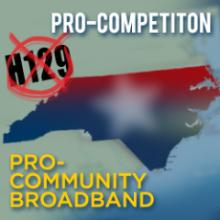Fast, affordable Internet access for all.
infrastructure
Content tagged with "infrastructure"
The Proper Role of Government in Broadband
The Proper Role of Government in Broadband
North Carolina and Broadband as Infrastructure
As stated above, S.L. 2011-84 imposes some significant limitations on a municipality’s authority to provide cable and Internet services. With some exceptions, the limitations apply to a “city-owned communications service provider.” A city-owned communications service provider is defined as:Though it is an extreme long shot, it would be fascinating to see a community build a network without charging a direct fee to access.This definition is important because the new limitations only apply to municipalities that meet all of its elements. In particular, the Act’s provisions only apply to a municipality that provides the listed services “for a fee.” That means that the requirements do not apply to any municipality that provides the above-listed communication services for free to the public. Many local governments provide free Wi-Fi service in their downtown or other central business areas. (In fact, I am taking advantage of Town of Carrboro’s free Wi-Fi as I draft this post.) If a municipality uses its unrestricted general fund revenue to finance this service, or any other communications services, it is not subject to the new Act’s provisions. (Note that many local governments actually offer this service by taking advantage of excess capacity on their internal broadband networks.)
- a city
- that provides cable, video programming, telecommunications, broadband, or high-speed Internet access service (collectively, communication services)
- directly, indirectly, or through interlocal agreement or joint agency
- to the public
- for a fee
- using a wired or wireless network (communications network).
North Carolina and Broadband as Infrastructure
As stated above, S.L. 2011-84 imposes some significant limitations on a municipality’s authority to provide cable and Internet services. With some exceptions, the limitations apply to a “city-owned communications service provider.” A city-owned communications service provider is defined as:Though it is an extreme long shot, it would be fascinating to see a community build a network without charging a direct fee to access.This definition is important because the new limitations only apply to municipalities that meet all of its elements. In particular, the Act’s provisions only apply to a municipality that provides the listed services “for a fee.” That means that the requirements do not apply to any municipality that provides the above-listed communication services for free to the public. Many local governments provide free Wi-Fi service in their downtown or other central business areas. (In fact, I am taking advantage of Town of Carrboro’s free Wi-Fi as I draft this post.) If a municipality uses its unrestricted general fund revenue to finance this service, or any other communications services, it is not subject to the new Act’s provisions. (Note that many local governments actually offer this service by taking advantage of excess capacity on their internal broadband networks.)
- a city
- that provides cable, video programming, telecommunications, broadband, or high-speed Internet access service (collectively, communication services)
- directly, indirectly, or through interlocal agreement or joint agency
- to the public
- for a fee
- using a wired or wireless network (communications network).
North Carolina and Broadband as Infrastructure
As stated above, S.L. 2011-84 imposes some significant limitations on a municipality’s authority to provide cable and Internet services. With some exceptions, the limitations apply to a “city-owned communications service provider.” A city-owned communications service provider is defined as:Though it is an extreme long shot, it would be fascinating to see a community build a network without charging a direct fee to access.This definition is important because the new limitations only apply to municipalities that meet all of its elements. In particular, the Act’s provisions only apply to a municipality that provides the listed services “for a fee.” That means that the requirements do not apply to any municipality that provides the above-listed communication services for free to the public. Many local governments provide free Wi-Fi service in their downtown or other central business areas. (In fact, I am taking advantage of Town of Carrboro’s free Wi-Fi as I draft this post.) If a municipality uses its unrestricted general fund revenue to finance this service, or any other communications services, it is not subject to the new Act’s provisions. (Note that many local governments actually offer this service by taking advantage of excess capacity on their internal broadband networks.)
- a city
- that provides cable, video programming, telecommunications, broadband, or high-speed Internet access service (collectively, communication services)
- directly, indirectly, or through interlocal agreement or joint agency
- to the public
- for a fee
- using a wired or wireless network (communications network).
North Carolina and Broadband as Infrastructure
As stated above, S.L. 2011-84 imposes some significant limitations on a municipality’s authority to provide cable and Internet services. With some exceptions, the limitations apply to a “city-owned communications service provider.” A city-owned communications service provider is defined as:Though it is an extreme long shot, it would be fascinating to see a community build a network without charging a direct fee to access.This definition is important because the new limitations only apply to municipalities that meet all of its elements. In particular, the Act’s provisions only apply to a municipality that provides the listed services “for a fee.” That means that the requirements do not apply to any municipality that provides the above-listed communication services for free to the public. Many local governments provide free Wi-Fi service in their downtown or other central business areas. (In fact, I am taking advantage of Town of Carrboro’s free Wi-Fi as I draft this post.) If a municipality uses its unrestricted general fund revenue to finance this service, or any other communications services, it is not subject to the new Act’s provisions. (Note that many local governments actually offer this service by taking advantage of excess capacity on their internal broadband networks.)
- a city
- that provides cable, video programming, telecommunications, broadband, or high-speed Internet access service (collectively, communication services)
- directly, indirectly, or through interlocal agreement or joint agency
- to the public
- for a fee
- using a wired or wireless network (communications network).
Lessig Promotes Publicly Owned Broadband at Personal Democracy Forum
I have long been a fan of Larry Lessig's work, so I was proud to see him use our work as the foundation for his presentation at the 2011 Personal Democracy Forum. He talks about the fundamental right of communities to build their own networks as well as Time Warner Cable's successful purchase of competition-limiting legislation in North Carolina.
Lessig Promotes Publicly Owned Broadband at Personal Democracy Forum
I have long been a fan of Larry Lessig's work, so I was proud to see him use our work as the foundation for his presentation at the 2011 Personal Democracy Forum. He talks about the fundamental right of communities to build their own networks as well as Time Warner Cable's successful purchase of competition-limiting legislation in North Carolina.
Lessig Promotes Publicly Owned Broadband at Personal Democracy Forum
I have long been a fan of Larry Lessig's work, so I was proud to see him use our work as the foundation for his presentation at the 2011 Personal Democracy Forum. He talks about the fundamental right of communities to build their own networks as well as Time Warner Cable's successful purchase of competition-limiting legislation in North Carolina.



